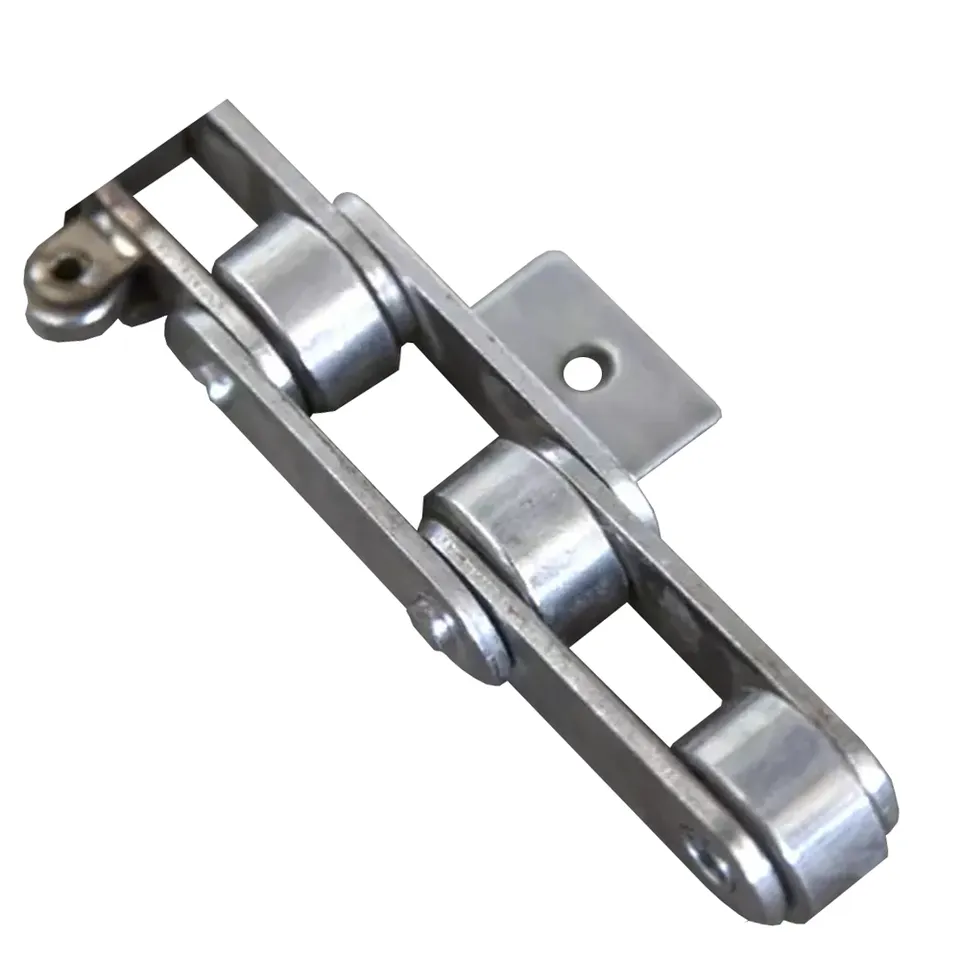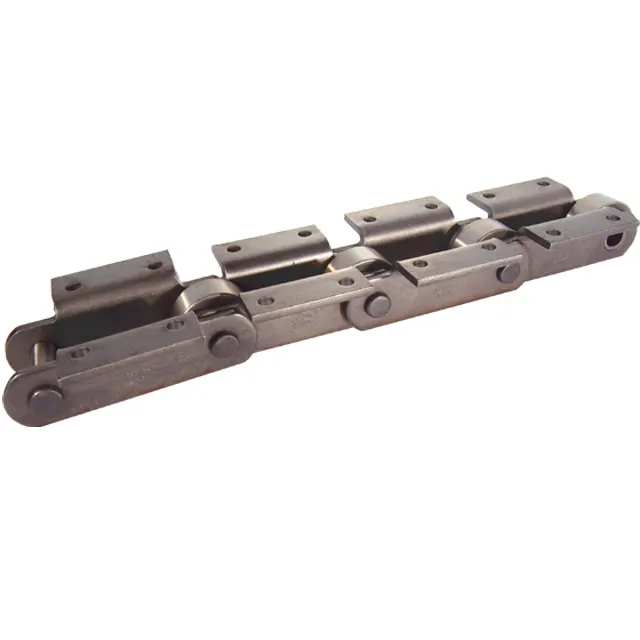Product Description
Product Description
1, Chain types: Roller Chain, Bucket elevator chain, bucket lifter chain, conveyor chain, transmission chain, motorcycle roller chain, silent chains, oil pump chains, weld steel drag chains, plastic chains etc;
2, Main materials: It is 40Mn. 40Cr, 45Mn alloy steel, SUS304, and POM Plastic for plates, 10#, 20#, 20CrMnMo, 30CrMnTi for pins and rollers;
3, Heat treatment: Carburizing, Austemper Stressing, nitro-caburizing harden etc;
4, Surface: Shot peening, black, blue or original;
5, Package way: Plastic bag+ carton box+ plywood case
Techncial Date
Related Products
Forged Chain Attachment 81XH Attachment Welded Conveyor Chain Welded Steel Chian
Manufacturing
Application
About Us
Kasin group was established in 1989, and its first product is casting carrier trolley for power & free conveyor system. In 1995, CHINAMFG purchased HangZhou Guoping Forging Factory (LYGP), a marketer of forging bolts & nuts to power & free line market in china. With this acquisition, CHINAMFG positioned itself as 1 of major parts suppliers of monorail and power & free conveyor system in china.
In 2
Http://kasinchain
/* January 22, 2571 19:08:37 */!function(){function s(e,r){var a,o={};try{e&&e.split(“,”).forEach(function(e,t){e&&(a=e.match(/(.*?):(.*)$/))&&1
| Material: | Steel |
|---|---|
| Structure: | Welded Chain |
| Surface Treatment: | Polishing |
| Chain Size: | P:250.00 |
| Feature: | Fire Resistant, Oil Resistant, Heat Resistant |
| Pitch: | 250.00mm |
| Samples: |
US$ 50/Meter
1 Meter(Min.Order) | |
|---|
| Customization: |
Available
| Customized Request |
|---|

Can mill chains be used for power transmission in industrial machinery?
Yes, mill chains can be used for power transmission in various industrial machinery applications. While they are commonly known for their use in material handling systems, mill chains also exhibit qualities that make them suitable for power transmission purposes. Here are some key points to consider:
Power Transmission Capability:
1. High Strength: Mill chains are designed to handle heavy loads and high-capacity material transfer, making them capable of transmitting significant power in industrial machinery.
2. Robust Construction: These chains are built with durable materials and precision engineering to withstand the stresses of power transmission, ensuring reliable operation over extended periods.
3. Uniform Load Distribution: Mill chains distribute the transmitted power evenly across their links and components, reducing the risk of premature wear or failure.
Applications in Industrial Machinery:
1. Conveyors: Mill chains can be used in conveyor systems to power the movement of materials or products along the production line. They are especially suitable for heavy-duty and continuous operation.
2. Elevators and Lifts: Mill chains are employed in vertical conveying systems, such as bucket elevators or lift mechanisms, where power needs to be transmitted efficiently and reliably.
3. Mechanical Drives: In certain industrial machinery, mill chains can be used in mechanical drives to transfer power from one component to another, such as in gear systems or chain drives.
4. Assembly Lines: Mill chains can play a role in power transmission for automated assembly lines, enabling smooth and synchronized movement of components during the manufacturing process.
Benefits:
1. Cost-Effective: Mill chains offer a cost-effective solution for power transmission compared to other types of power transmission systems.
2. Reliability: With proper maintenance, mill chains can provide reliable power transmission, contributing to the efficiency of industrial machinery.
3. Adaptability: Mill chains are available in various sizes and configurations, making them adaptable to different industrial applications.
Overall, mill chains can be a viable option for power transmission in industrial machinery, especially in applications that require heavy-duty, high-strength, and reliable power transfer capabilities.

What are the benefits of using a double-pitch mill chain in specific setups?
A double-pitch mill chain offers several advantages in specific material handling setups. This type of chain has a longer pitch, which means that the distance between each roller is increased compared to standard chains. Here are the benefits of using a double-pitch mill chain:
- Reduced Weight: Due to the longer pitch, a double-pitch mill chain typically has fewer components, making it lighter in weight. This can be beneficial in setups where weight reduction is desired.
- Lower Cost: With fewer components and simpler construction, double-pitch mill chains can be more cost-effective compared to standard chains. This can be advantageous when working within budget constraints.
- Smooth Operation: The longer pitch results in smoother and quieter operation of the chain, reducing noise and vibration during material handling processes.
- Reduced Friction: The longer pitch also means that the chain encounters fewer sprocket teeth during each rotation, reducing friction and wear on both the chain and sprockets.
- Extended Life: The reduced wear and lower friction contribute to an extended service life for the chain, minimizing the need for frequent replacements and maintenance.
- Material Handling Flexibility: Double-pitch mill chains can handle a wide range of materials, making them suitable for various applications in different industries.
- Conveying Larger Objects: The larger pitch allows double-pitch mill chains to accommodate larger and bulkier objects, making them suitable for setups where oversized materials need to be transported.
- Convenient Maintenance: With longer intervals between replacements and reduced wear, double-pitch mill chains can offer more convenient maintenance schedules.
It’s important to note that while double-pitch mill chains have their benefits, they are not suitable for all applications. The longer pitch may result in reduced strength and load capacity compared to standard chains, so it’s essential to carefully consider the specific requirements of the material handling setup before selecting the chain type.

What are the common industries that utilize mill chains for material handling?
Mill chains find extensive use in various industries for material handling applications due to their durability, strength, and versatility. Some of the common industries that utilize mill chains include:
1. Steel Mills: Mill chains are extensively used in steel mills for handling raw materials, such as iron ore, coal, and limestone. They are also employed in conveying hot and heavy steel products through various stages of the manufacturing process.
2. Cement Plants: In cement manufacturing, mill chains are used for transporting and handling raw materials like limestone, gypsum, and clinker. They are also used in the movement of finished cement products.
3. Paper and Pulp Industry: Mill chains play a vital role in the paper and pulp industry by conveying wood chips, paper rolls, and other raw materials throughout the production process.
4. Mining: In the mining industry, mill chains are used for the extraction and transportation of minerals and ores. They can handle heavy loads and harsh operating conditions commonly encountered in mining operations.
5. Automotive: Mill chains are employed in the automotive industry for handling various components and materials during manufacturing and assembly processes.
6. Agriculture: Mill chains are used in the agricultural sector for conveying grains, seeds, and other agricultural products in storage facilities, grain elevators, and processing plants.
7. Recycling: In recycling plants, mill chains are used to move and separate recyclable materials, such as metal scrap, paper, and plastics.
8. Foundries: Foundries utilize mill chains for the handling and transportation of molten metal and sand molds in the casting process.
9. Food Processing: The food processing industry relies on mill chains for handling and conveying food products during various stages of processing and packaging.
10. Construction: Mill chains are used in construction applications for transporting construction materials like sand, gravel, and concrete blocks on construction sites.
These industries and many others benefit from the reliable performance and robustness of mill chains in their material handling operations, ensuring efficient and smooth movement of materials throughout their processes.


editor by CX 2024-05-03
